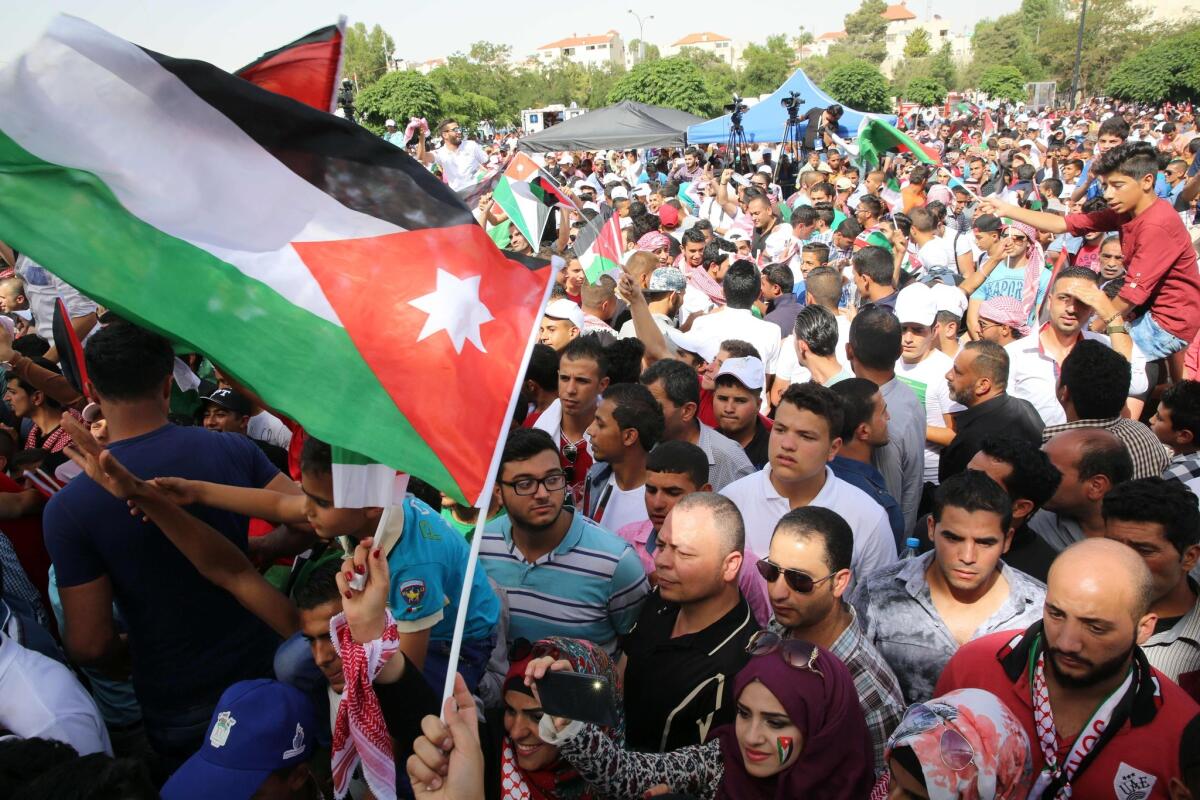Jordan scholar falls from government grace after criticizing role in fight against Islamic State

- Share via
Reporting from Beirut — For many Jordanians, the hip scholar personified the elusive blend that made up the “moderate Islam” promoted by the country’s leaders.
Amjad Qourshah, a steady presence on state TV and social media, appeared to espouse the government’s pro-Western policies even while maintaining his Islamist credentials with thousands of the country’s conservative Muslims.
But Qourshah’s recent arrest after a 2-year-old video surfaced showing him criticizing Jordan’s role in the fight against the extremist group Islamic State sent a disturbing message to many in the nation: that the government has a growing intolerance for those who question its actions against Islamic State and is willing to crack down on free speech.
“The fact that the government was public about what happened to this man means that they wanted to send a message that their tolerance is at a minimum,” independent political analyst Labib Kamhawi said in a phone interview from Amman, the Jordanian capital.
In the 2014 video, Qourshah, speaking from inside his car, criticizes the “weak, fragile government” for involving Jordan “in a war which we have nothing to do with.” He also hinted that any attacks in Jordan were probably the work of the CIA.
Another video, released a few weeks after Jordan had begun conducting airstrikes against Islamic State, shows Qourshah saying the U.S. had tricked the heads of Jordan’s army, air force and intelligence service into bombing “those of whom we think positively … the brothers of the Nusra Front.”
Al Nusra Front is Al Qaeda’s Syrian affiliate. Although it is designated as a terrorist group by the U.S. and Jordan, many Syrians and their supporters among Sunni Muslims see the militants as a benevolent force.
Qourshah described the government of Syrian President Bashar Assad as “Nusayri,” a pejorative name for the heterodox Alawite sect of Islam to which Assad belongs.
Jordan’s State Security Court in June charged Qourshah with performing “acts that could expose the kingdom to hostile acts, disturb its links to a foreign state or expose Jordanians to the danger of acts of vengeance against them or on their money,” an amendment that appears under Jordan’s toughened anti-terrorism laws adopted in 2014.
Human rights activists contend the amendment gives the government sweeping powers to curb freedom of speech and detain without trial those it suspects of being linked to extremist groups. It also in effect criminalizes any support for Islamic State on social media, activists said. Hundreds of people have been taken into custody for investigation in recent months.
At the time of their ratification by parliament, government spokesman Mohammad Momani said the tougher laws were instrumental in dealing with an influx of Jordanians returning from the fighting in Syria’s civil war.
On Thursday, Qourshah, 49, was denied bail for a second time.
“This whole trial is not legal,” his lawyer, Mahmoud Dqoor, said in a phone interview from Amman. “He also should be tried in a normal civil court. He is not a combatant.”
Dqoor also said the videos of Qourshah expressing his views had come before Jordan suffered attacks at the hands of Islamic State and its supporters.
Last year, the group burned alive Lt. Moaz Kasasbeh, a Jordanian F-16 pilot who crash-landed near Raqqah, Islamic State’s de facto capital in Syria.
In November, in what was thought to be a “lone wolf” attack inspired by Islamic State, a police captain killed five people, including two Americans, in an international police training center. Last month, another gunman killed three intelligence officers and two others in a Palestinian refugee camp near the Jordanian capital and an Islamic State car bomb killed Jordanian soldiers near the border with Syria.
Over the years, Qourshah, an assistant professor of religious studies at the University of Jordan, had appeared in hundreds of videos, animated cartoons and TV shows to discuss religious topics with youth. He attended Birmingham University in England on a state scholarship for his doctorate and was part of the government’s committee on religious tolerance.
But he also infuriated liberals and secularists in Jordan, who repeatedly called for him to be removed from the public eye. He insisted women should wear the hijab, or head covering, called for the cancellation of festivals where the sexes would mix and opposed Muslims wishing Christians “Merry Christmas.”
Some commentators, nevertheless, wondered about the effectiveness of arresting such outspoken people.
“I’m opposed to anyone being detained, whether I agree with them or are very much against them, on the basis of criticizing the state’s policies,” Lamis Andoni, an independent journalist, wrote on her Facebook page after Qourshah’s arrest.
Naseem Tarawnah runs a blog called Black Iris.
“When it comes to ideological leaders like Qourshah ... is the vote swayed when someone like him is jailed?” Tarawnah said in an interview. “Or do [extremist] communities grow simply out of defiance of the state?”
Bulos is a special correspondent.
More to Read
Sign up for Essential California
The most important California stories and recommendations in your inbox every morning.
You may occasionally receive promotional content from the Los Angeles Times.














